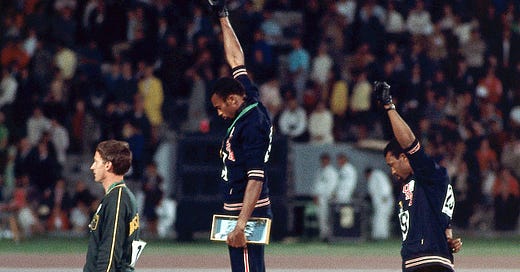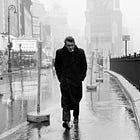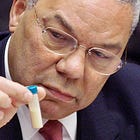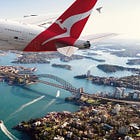In the 1998 movie Sliding Doors, a fresh-faced Gwyneth Paltrow gets canned from her PR gig, rushes for the train, and we then get two versions of her life: one where she boards the train, the other where she doesn’t. I don’t think I’m spoiling anything by revealing there’s drama and tragedy in both scenarios, a twist at the end, and the overall effort seems to be geared toward telling the viewer their lives will suck no matter which path they take. Thanks, Gwyneth.
In the 27-odd years since, though, the “sliding doors” concept has stuck. It’s usually cited as a one-off choice—“I should have ordered the chocolate ice cream!”—but the reality is far more complicated. Sliding doors moments are never singular: you make one choice that leads to another and another and another and before you know it, the hunky guy you’re having a baby with is actually married, you die during delivery, and Hollywood is asking why your movie is such a downer.1
By 2006, I’d chosen a handful of doors that would cement my life for the next couple of decades. I’d decided to stay in United States rather than return to Sydney, and spent a couple of years bumbling around. When I seemed set to go home after all, a rapidly approved green card saw me turn my back on Australia entirely. Then, having knocked off my book and begun the search for a real job, I ditched reporting and writing, joining Bloomberg in New York City as an editor. At the time, these seemed to be logical, sort-of-well-considered decisions. In hindsight, they were a series of single steps that put me on a path to a destination I’m only now correcting.
In 2006, Australia was doing much the same.
The Coalition government of Prime Minister John Howard introduced “WorkChoices,” Orwellian-named legislation that stripped workers’ rights, empowered employers, and generally sought to make Australia’s labor market as precarious as America’s. The government also decided foreign ownership of Australian media was peachy keen—especially since Rupert Murdoch was … [checks notes] … American. A severe and prolonged drought prompted the creation of the National Water Commission, while the year began with bushfires raging through New South Wales and Victoria after one of the hottest New Year’s on record. Oh, and Cyclone Clare hit Western Australia.
Could the country have chosen to maintain worker protections and some balance between employers and employees? Sure.2 Could it have viewed the increasing frequency and intensity of bushfires and climate events as the catalyst for serious efforts to address global warming? Sure. Could Steve “Crocodile Hunter” Irwin have stopped being a wanker for just a second and left that stingray alone? Absolutely.3 The trajectory of lives and countries hinges on choices like these. Fernando Alonso won the Australian Grand Prix in 2006, driving for Renault. He’d go on to win his second successive Formula One World Drivers’ Championship before picking the door marked “McLaren” and never winning another one.4
One major event from this year still hurts like a stingray barb. For the first time since 1974, Australia qualified for the FIFA World Cup. Making it to the tournament in Germany already constituted a win—anything else was most definitely a bonus. But in the first game, the Socceroos defeated Japan 3-1—our first ever World Cup victory. In the next fixture, we lost 0-2 to Brazil but then drew 2-2 with Croatia, robbed by the referee blowing the final whistle literally as John Aloisi scored. But with Brazil defeating Japan, we were through to the next round!
The Socceroos faced Italy and it was a crackerjack game. I remember being on the edge of my seat, riveted by a classic back-and-forth, sphincter-clenching affair with the Aussies holding firm against an Italian squad bulging with talent (Pirlo! Buffon! Totti! Del Piero! Toni!), but playing with ten men after a red card just after half time. Then, with five seconds left in regular time and the score tied at 0-0, Fabio Grosso blatantly dived over Lucas Neill and was awarded a penalty, accompanied by the commentator noting: “That’s more than debatable. It looks a shocker of a decision.” Talk about sliding doors—Italy went on to lift the trophy.
Still, sometimes people make the right choice.
At the 1968 Summer Olympics, Australian athlete Peter Norman ran brilliantly to grab silver in the 200 meters. You’ll have seen the photograph of that medal ceremony but most don’t even notice Norman—he’s the white guy standing with American sprinters Tommie Smith and John Carlos, who have single, black-fisted arms aloft in one of history’s most iconic human rights protests. But Norman was more than a mere spectator: he actively sought to wear a badge in support of the Olympic Project for Human Rights, and had suggested Smith and Carlos each wear one glove because Carlos had forgotten to bring his to the podium.
Smith and Carlos were ostracized for their actions. Norman was reprimanded by the Australian Olympic Committee, and not selected for the 1972 games despite making the qualifying time repeatedly (his 200-meter national record stood for 56 years, only broken six months ago). When Sydney hosted the 2000 Summer Olympics, Norman wasn’t invited to be honored along with other Australian legends. It was only after the 2008 release of a documentary driven by his nephew that he received belated recognition—including a formal federal government apology in 2012 that acknowledged, among much else, “the powerful role that Peter Norman played in furthering racial equality.”
Norman saw none of this, dying in October 2006. Smith and Carlos were pallbearers at his funeral.
Note: The photograph accompanying this post is by the legendary Neil Leifer.
I write this for fun, not money. But if you want to shout me to a (probably terrible no-doubt-inferior-to-anything-in-Australia) flat white or magic, it’d make my day!
About this series: Australian almanac
This is part of a series of articles examining what the heck has happened in Australia in the 24-odd years I’ve been living in the United States. The introduction to this series is here, and related posts below:
OK—this is indeed one of Sliding Doors’ two scenarios. In the other, she misses the train, bumbles along with her douchey boyfriend, still loses her baby, but then meets the hunky guy she met in the alternate storyline and all ends well. Phew.
WorkChoices ended up being a critical issue in the 2007 federal election that saw the Labor Party return to power for the first time since 1996. New Prime Minister Kevin Rudd repealed the legislation, replacing it with the Fair Work Act 2009.
Irwin died on September 4, 2006 after being pierced in the chest by a stingray barb while filming in the Great Barrier Reef. FWIW, he did a ton of great, incredibly laudable work, left an amazing legacy, and I don’t knock him for playing up the Aussie angle to make a buck. But I do confess I had a Crocodile Hunter costume all set for Halloween 2006 and decided against it. Just six weeks after his death seemed a touch too soon, although I suspect while my American friends may have been horrified, the Australian ones would have found it hilarious.
Where there’s life, there’s hope. Alonso is still racing in Formula One at the age of 43 (!), this year for Aston Martin. I regard him as one of the greatest drivers of all time—and just watch how he responds whenever he gets a sniff of a chance. Vamos!








